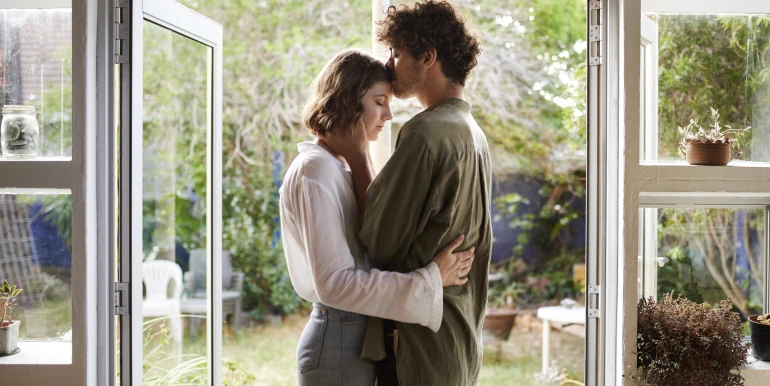
Why touch is important for our body and mind
Hugging, cuddling and kissing: physical closeness has a beneficial effect on our health. It reduces stress, calms us down and strengthens the cardiovascular system.
Try shutting off your senses. Close your eyes and mouth, block your ears and pinch your nose. Now, you can’t see, taste, hear or smell. But you can still feel. For example, you can feel the floor under your feet. Or the hair brushing your face. Our sense of touch is the only sense that is always active, and it’s the first sense that we develop.
Touch is irreplaceable
At just eight weeks old, a baby can feel their mother stroking her belly. We experience close physical contact from birth. Babies need touch so that their nervous system and the brain can develop.
There are up to 20 million sensitive sensory cells in our skin that send lightning-fast signals to our brain. Most people need physical closeness throughout their lives – and for good reason. Helsana health expert, Julia Pieh, explains:
Touch doesn’t just influence our mental health. We also need it to stay healthy. A lack of hugs and closeness can lead to stress, high blood pressure and a weaker immune system.
Hugging is a simple remedy for anxiety and stress
When hugging, your body releases neurotransmitters, otherwise known as happiness hormones. The “cuddle hormone”, oxytocin, has a calming effect; it helps reduce stress and strengthens bonds between people. A hug is the earliest form of personal closeness in our lives. “Touch alone doesn’t have a huge effect,” says Pieh. “What’s important is the connection between your skin and feelings. The person needs to think of themselves as a whole.”
Hugs that last longer than five seconds have a greater influence on our well-being than those that last three seconds or less. This was discovered by English researchers in a study.
We feel better when we receive longer, more intimate hugs, and our body shows this in a few ways:
- We breathe more deeply.
- Our muscles relax.
- Our blood pressure sinks.
- We feel less anxious.
What if you don’t have anyone to hug?
Oxytocin isn’t just released when we have personal contact with humans. The body also produces oxytocin when we stroke or hug animals, especially dogs and cats. This contact and the animal’s body temperature stimulates the skin, just like with human touch. Studies show that if you aren’t keen on animals, hugging a tree has the same effect.
Kissing stimulates the circulation
Kissing is closely related to hugging. It makes our heart beat faster. Hormone experts from the Medical University of Vienna established that kissing can combat problems with the cardiovascular system. The pulse rises and blood vessels dilate, which means the organs are better supplied with blood.
Kissing for at least three minutes, on a regular basis, reduces high blood pressure and improves cholesterol levels. Kissing also transmits around 80 million bacteria, which are luckily rendered harmless by the immune cells. This, in turn, strengthens the immune system.
... promotes happiness hormones.
… reduces blood pressure.
... mobilises our immune system.
… prevents cardiovascular diseases.
... reduces anxiety and tension.
... reduces stress and pain.
Do you remember your first kiss?
From birth, children are kissed and hugged by their parents, grandparents, siblings and extended family. We are kissed thousands of times and in different ways. During adolescence, we experience our first “real kiss”. It’s an exhilarating feeling – and it’s healthy. When lips and tongue touch, a cocktail of hormones gets released. Neurotransmitters such as oxytocin, adrenaline and dopamine create feelings of happiness, reduce pain and even relieve tension.
Our health consultation advisors have useful tips on how to keep your mental and physical health in balance.
Hold your partner’s hand
Hug the important people in your life for at least five seconds. Give your pet lots of strokes. Or hug your favourite tree next time you are out on a walk. It will do your body and mind a power of good and improve your well-being. Hold your partner’s hand and give them an intimate kiss. It’s easy! Don’t forget to give your loved ones a kiss on the cheek next time you see them, and enjoy the happiness hormones that your body releases.

The expert provided the editorial team with advice and input for this article. Julia Pieh (doctorate in pharmacy and toxicology, pharmacist, naturopath) works in the Helsana Health Consultation Service.


Newsletter
Find out more about current health issues every month and get all the information you need about our attractive offers from all Helsana Group companies * delivered by e-mail to read whenever it suits you. Our newsletter is free of charge and you can sign up here:
We did not receive your information. Please try again later.
* The Helsana Group comprises Helsana Insurance Company Ltd, Helsana Supplementary Insurances Ltd and Helsana Accidents Ltd.